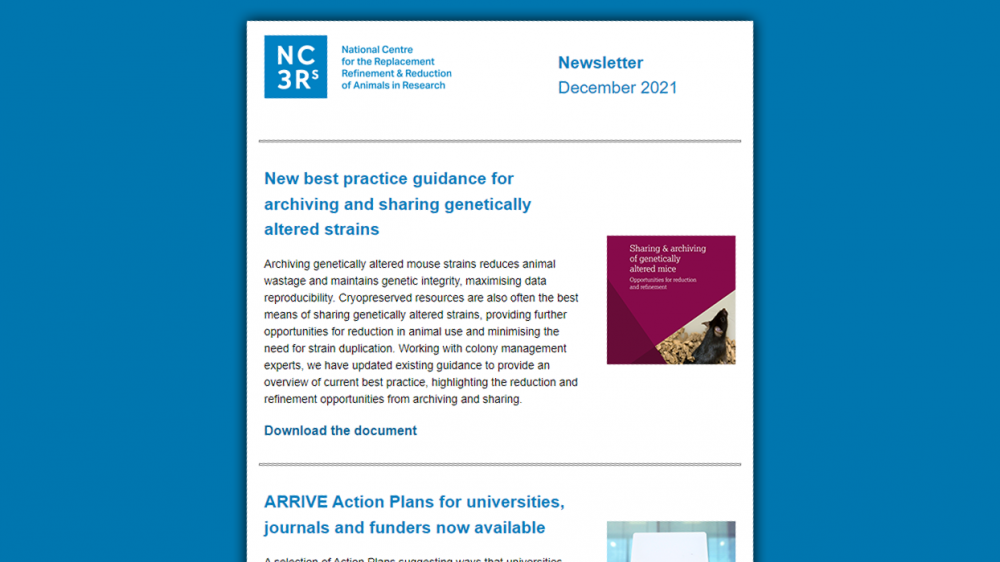Latest news from the NC3Rs: July 2023
In this issue
- NC3Rs bursaries for 3Rs abstracts at LASA’s annual conference
- Catch up: 3Rs Prize event
- Resource update: Summary sheets for refining head fixation and fluid control in rodents
- Technology Partn3Ring webinar series
- Conference: NC3Rs at WC12 Canada
- Webinar: Virtual demonstration of the Experimental Design Assistant
- Workshop: Implementing the 3Rs in WHO biologicals guidelines
- Workshop: Applying the 3Rs to urinalysis assessments in toxicity studies: refining procedures and adopting a case-by-case approach
- Galleria Mellonella Workshop 2023
- New 3Rs product: PeptiMatrix synthetic hydrogels
NC3Rs bursaries for 3Rs abstracts at LASA’s annual conference
We are excited to be sponsoring the 3Rs session at the Laboratory Animal Science Association’s 60th anniversary conference in November. NC3Rs Programme Manager for Early Career Awards, Dr Natalie Duggett, will join LASA convenors to review abstracts and select speakers who demonstrate impressive 3Rs advances and innovation. Bursaries of up to £500 will be awarded to all speakers selected for the 3Rs session to cover their cost of attendance, including registration, travel and accommodation.
Abstract submissions from early career researchers and animal technicians are particularly welcome.
Catch up: 3Rs Prize event
If you missed 3Rs Prize winner Dr Lisa Wagar talking about her animal-free organoid model of adaptive immunity, you can catch up now on our YouTube channel. Dr Ali Sarrami Foroushani also presented his highly commended paper, with Professor Alex Frangi, on the first ever in silico clinical trial for a medical device.
Watch the 3Rs Prize event recording to find out how replacement approaches can streamline vaccine development and medical device assessment.
Resource update: Summary sheets for refining head fixation and fluid control in rodents
Following publication of the recommendations and guidance from an NC3Rs working group on the use of fluid control and head fixation in mice we have produced a series of summary sheets for different key audiences. Whether you are a researcher using these techniques, an animal technician caring for mice undergoing these procedures or a member of an ethical review body such as an AWERB or IACUC, there is a summary sheet for you.
Technology Partn3Ring webinar series
The technology pitches from our inaugural Technology Partn3Ring webinar are now available to view online. Each presentation outlines an exciting new technology and collaboration opportunity with the potential for scientific and 3Rs impacts. Email us to be connected with the speakers and find out more about the collaboration opportunities: innovations@nc3rs.org.uk
Visit the Technology Partn3Ring website page to receive alerts about future webinars and watch the latest recordings.
Conference: NC3Rs at WC12 Canada
Sunday 27 August – Thursday 31 August, Niagara Falls, Canada
The twelfth World Congress on Alternatives and Animal Use in the Life Sciences will be held in Niagara Falls, Canada with the theme '3Rs over the edge: regulatory acceptance and next-gen education'. Several members of the NC3Rs team will be attending, chairing sessions and delivering talks and posters.
Webinar: Virtual demonstration of the Experimental Design Assistant
Thursday 14 September, 16.00 – 17.00 (BST)
Our Experimental Design Assistant (EDA) tool helps researchers at any level design robust in vivo experiments. Following a presentation on the key aspects of the online tool, Dr Esther Pearl (NC3Rs Experimental Design Programme Manager) will answer questions on how you can use the EDA to design and plan your next study. Limited spaces are available on a first come first served basis and attendees are eligible for CPD points.
Workshop: Implementing the 3Rs in WHO biologicals guidelines
Tuesday 19 – Wednesday 20 September, central London and online
Registration is open to attend a two-day workshop showcasing the outputs from our project to review animal use requirements in WHO biologics guidelines focusing on quality control and batch release testing. The workshop will highlight the findings and recommendations for inclusion of the 3Rs from the last three-years’ work.
Workshop: Applying the 3Rs to urinalysis assessments in toxicity studies: refining procedures and adopting a case-by-case approach
Tuesday 31 October, 10.00 – 18.00 (GMT), central London
We are collaborating with the Association for Comparative Clinical Pathology (ACCP) to host a workshop to bring a fresh perspective to urinalysis assessments in toxicity studies.
The workshop will address welfare issues related to urine collection methods and the value of urinalysis for decision-making through a series of talks, case studies from pharmaceutical and agrochemical sectors, breakout discussion sessions and posters.
Galleria Mellonella Workshop 2023
Wednesday 13 September, 10.30 – 16.00 (BST)
The Galleria Mellonella Research Centre (GMRC) are hosting a workshop to bring together the Galleria research community and offer hands-on training for scientists working with or interested in Galleria wax moths as a replacement model.
Organised by GMRC co-director and NC3Rs-funded postdoc Dr Jennie Campbell, this event is funded by Jennie’s NC3Rs Early Career Engagement award. These awards support NC3Rs-funded PhD students and postdocs to develop their skills, professional networks and careers whilst building a lasting 3Rs legacy.
New 3Rs product: PeptiMatrix synthetic hydrogels
Spinning out from Professor Cathy Merry’s lab at the University of Nottingham, PeptiMatrix have launched their fully synthetic peptide hydrogels as an animal-free alternative to support 3D cell growth for complex in vitro models.
Cathy was awarded an NC3Rs Project grant in 2016 to demonstrate the use of bespoke synthetic hydrogels in breast cancer research to mimic the tumour extra-cellular matrix – a key driver of cancer growth which is not represented by existing hydrogels derived from mouse sarcomas. With further funding from an NC3Rs Technologies to Tools grant, the group developed an array of chemically-defined peptide hydrogels to model multiple tissues and disease environments. The Merry lab is now applying this technology to culture gastruloids, with the aim of replacing genetically altered mouse embryos in embryogenesis research.
Create a website account to subscribe and get the latest articles, events and funding opportunities from the NC3Rs in your email inbox every month.

